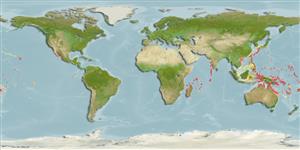>
Gobiiformes (Gobies) >
Gobiidae (Gobies) > Gobiinae
Etymology: Eviota: No etymology given, suggested by Christopher Scharpt: from Latin 'eu' for 'true' and 'iota' for anything very small, in combination 'truly very small' referring to it as being the smallest vertebrate at the time it has benn described by Jenkins (thus, making the suggestion by Scharpt plausible.
More on authors: Jewett & Lachner.
Environment: milieu / climate zone / depth range / distribution range
ນິເວດວິທະຍາ
ສັດທະເລ ກ່ຽວກັນຫີນ; ລະດັບຄວາມເລິກ 3 - 20 m (Ref. 90102). Tropical
Indo-West Pacific: Seychelles to Indonesia, north to Japan (Ogasawara Islands); east to Micronesia and Melanesia to Wallis and Futuna; south to Australia (Western Australia and Great Barrier Reef). The species in the Philippines, Fiji and Tonga is considered E. cf. sigillata.
Length at first maturity / ຂະໜາດ / ນ້ຳໜັກ / Age
Maturity: Lm 1.3, range 1 - 2 cm
Max length : 3.0 cm SL ຕົວຜູ້/ບໍ່ມີເພດ; (Ref. 48637); ອາຍຸສູງສຸດທີ່ເຄຍລາຍງານມາ: 0.16 ປີ (Ref. 58013)
ຄີ (ໜາມ)ແຂງຢູ່ຫຼັງປາ (ທັງໝົດ) : 7; ຄີຫຼັງຂອງປາ (ຄີອ່ອນ) (ທັງໝົດ) : 8 - 10; ຄີ(ໜາມ) ແຂງຢູ່ຄີກົ້ນປາ
ກຸ່ມປາກະດູກແຂງ
ຄວາມຖີ່ຂອງກຸ່ມຖ່າຍທອດພັນ
ປາທີ່ມີການເຄື່ອນຍ້າຍຈາກທະເລໄປຫານ້ຳຈືດ ແລະນ້ຳຈືດຫາທະເລ
ປາທີ່ມີການເຄື່ອນຍ້າຍຈາກທະເລແລະໄປໄຂ່ຢູ່ນ້ຳຈືດ
ຄີກົ້ນຂອງປາ
ສັດທີ່ມີກະດູກສັນຫັຼງ
ການຖ່າຍທອດທາງກຳມະພັນຈາກພໍ່ແມ່ຫາລູກ: 1; ຄີກົ້ນຂອງປາ: 7 - 8. Characterized by semi-translucent body with irregular, internal reddish midlateral stripe; white stripe along spinal column interrupted by reddish bars that extend ventrally; row of small reddish spots along dorsal midline; usually with narrow reddish bars above anal fin; often prolonged and filamentous first four dorsal spines of male and first three of female; unbranched pectoral rays; longitudinal scale series 21-24; ctenoid scales, absent on head , nape and pectoral fin base; depth of body 4.3-5.0 in SL (Ref. 90102).
Adults live for 59 days at the most, with larvae spending three weeks in the open ocean and maturing within two weeks of settling on a reef, leaving the adults (which are 1 to 2 centimeters long) just three weeks to reproduce. This strategy of 'live fast, die young' is perceived to be a response to intense predation. Daily mortality rate, from tag-recapture data, might be as high as 8% (Ref. 54199). Occur at depths less than 4 to between 17 and 21 m on sandy bottoms of lagoon reefs (Ref. 1602, 37816, 48637). Minimum depth from Ref. 58018. Spawning appears to be repeated on a regular cycle, semilunar or every 14 days (Ref. 116739).
Myers, R.F., 1991. Micronesian reef fishes. Second Ed. Coral Graphics, Barrigada, Guam. 298 p. (Ref. 1602)
IUCN Red List Status (Ref. 130435: Version 2024-1)
Threat to humans
Harmless
Human uses
ເຄື່ອງມື
Special reports
Download XML
ແຫຼ່ງອີນເຕີເນັດ
Estimates based on models
Preferred temperature (Ref.
123201): 24.7 - 29.3, mean 28.1 °C (based on 1837 cells).
Phylogenetic diversity index (Ref.
82804): PD
50 = 0.5000 [Uniqueness, from 0.5 = low to 2.0 = high].
Bayesian length-weight: a=0.00692 (0.00284 - 0.01683), b=3.10 (2.92 - 3.28), in cm total length, based on LWR estimates for this Genus-body shape (Ref.
93245).
ຊັ້ນເຂດຮ້ອນ (Ref.
69278): 3.1 ±0.3 se; based on size and trophs of closest relatives
Generation time: 0.1 ( na - na) years. Estimated as median ln(3)/K based on 1
growth studies.
ຄວາມຢືດຢຸ່ນ (Ref.
120179): ສູງ, ປະຊາກອນຕຳ່ສຸດທີ່ໃຊ້ເວລາສອງໜ້ອຍກວ່າ 15 ເດືອນ (tmax=0.16; Fec = 400 (lifetime)).
Fishing Vulnerability (Ref.
59153): Low vulnerability (10 of 100).
Nutrients (Ref.
124155): Calcium = 3390 [88, 549,132] mg/100g; Iron = 38.8 [1.2, 783.6] mg/100g; Protein = 16.9 [10.7, 23.2] %; Omega3 = 0.0501 [, ] g/100g; Selenium = 2830 [6, 995,074] μg/100g; VitaminA = 0.262 [0.000, 369.350] μg/100g; Zinc = 105 [5, 1,034] mg/100g (wet weight);
